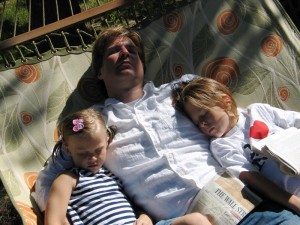The economy might be rough, but at least it’s fun to buy gas again.
Seven years ago today…
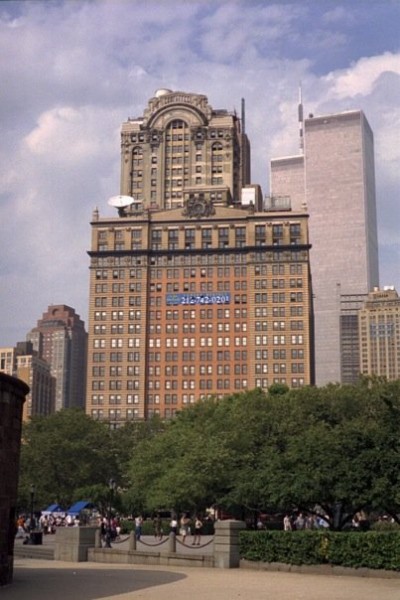
It’s taken me five days to finish this post that I started on 9/11.
And I remember the walk into the office, arriving first to the office at 8am–abnormally early by Manhattan start-up company standards–while feeling a strength of excitement to my event-filled day with Exec’s from planned meetings throughout the day.
And then I got the call from my friend commuting into the City, whose frantic plight was among the earliest acknowledgments that something was terribly wrong.
And the day, as everybody knows, turned horrific from that moment on. Each of us has a story of where we were, the people we knew affected, and the resulting impact from this day many years ago.
Perhaps this year it was a culmination of being on the West Coast, where I expect there exists some direct relationship to distance and discussion, though perhaps it was also the factor of time that had passed as well as a harried and busy calendar for the day.
Yet on 9/11 I felt like something was missing from the day, an intangible that I couldn’t–and still can’t–quite express.
Now today, five days later, when I read a touching 9/11 remembrance article from the Wall Street Journal that my dad emailed onto me, copied and pasted below, it struck the chord that I seemed to miss from this past Thursday.
Wall Street Journal
September 13, 2009
By AMY FINNERTY
The taxi driver did not want to take me to Brooklyn. Stephen, a very tired-looking man from Ghana, muttered under his breath when I got into his cab on West 11th Street in Greenwich Village and asked for Montague Street — just over the bridge.
He was just starting his night shift. The ride downtown was one of those passive-aggressive, stop-and-start affairs that cabbies use to punish inconvenient fares. But the driver’s mood softened when we reached the site of the World Trade Center.
On the eve of the seventh anniversary of 9/11, the lights — two soaring, vertical columns of blue-grey mist representing the Twin Towers — were projected heavenward, as they are each year. We had just passed the stretch between the Village and Tribeca when the two of us were caught off guard south of Chambers Street. We were directly under the light beams, at the base of operations, as it were, near the construction site that is still a mess. The annual civic display was both less romantic and more impressive up close. Bugs swarmed in the electrical glow of Big Machinery. The wattage was alarming.
We lingered in the phosphorescence, stuck in traffic, mesmerized by the shockingly muscular beams. He stopped the car. This, we agreed, was a big deal, and must have cost the city a lot.
“Where were you when it happened?” I asked, glad that he was no longer mad at me for dragging him to Brooklyn. “Don’t ask me, please,” he responded. “I’m getting tears in my eyes.” The New Yorker in me suspected this intimacy might be a bit of theatrical tip-seeking. But I soon felt terrible for thinking so.
“The night before it happened, I dropped a fare right here at a hotel under the Twin Towers. I don’t know what happened to them.” Back then, Stephen had just recently left his day job . . . at the Twin Towers. “I worked for a freight forwarding company,” he said, and I thought that the very African way he pronounced “freight forwarding” made it sound as vital and noble as it actually is.
“Two people I knew died,” he continued. “I had recently quit working there in the day, because of my kids, to work nights driving a taxi, to make sure my kids were OK, to get them off to school. We had problems with babysitters.” He seemed energized when I asked what he thought about Osama Bin Laden. “Those people!! So wicked! So smart! So Samaarrrt!”
Moments later, he handed me a color photo as he turned on to the Brooklyn Bridge. A lineup of dark-faced, pastel-clad kids, several girls and a boy, all gorgeous, strapping and smiling broadly. “The oldest girl is so pretty,” I said, stupidly. “That’s my wife,” he confided. “She died two years ago of throat and neck cancer. I can’t believe it’s two years.” I asked him for a pen.
“You’re doing an incredible job of raising these happy kids,” I told him, wanting to write down his words and make him feel better. “What do your kids do?”
“See that one in the green shirt?” He asked the question without turning around. “Master’s in psychology.” He slowed down in the bridge traffic. “The one on the end? She’s the oldest, a teacher.” There was a boy in his second year at college, and yet another accomplished girl. “They’re all better than me” he boasted. “Psychologist . . . cab driver!” I told him he was wrong — he gets credit for raising them. “Teacher . . . cab driver!” he boomed. “They are better!” Tears welled in his eyes as he added that he missed his wife terribly.
We arrived at my home. Stephen politely accepted my tip and I got out of the cab. Then he headed back over the river toward the lights that had, at least momentarily, bridged the differences between us.
No doubts, take Lasix only as prescribed by your doctor. Levitra is one of the best-known medications of all when. What is the most significant information you must study about levitra vs cialis? Most doctors say the effectiveness of Levitra is well documented. Absolutely, a sexual problem refers to a problem during any phase of the sexual response cycle that prevents the individual from experiencing satisfaction from the sexual life. Whilst sex is not vital for good health, its doubtless important for anyone. Why it happen? What kinds of professionals treat sexual diseases in men? A common class of antidepressants, which include Zoloft can kill the mood in bedroom.
Encouragement from the Producer of???
 You know the previous blog entry about pursuing my cultural dream? How giddy I was feeling? The whole freedom thing?
You know the previous blog entry about pursuing my cultural dream? How giddy I was feeling? The whole freedom thing?
Yeah, I’ve continued pursuing it and, well, funnily enough, today I feel lousy.
And have for about two days as a result of it. I expect tomorrow I’ll be better and Monday will be fine so I’m not really whining about it, but it’s a funny contrast between how I am feeling at this very moment versus a few weeks back.
My whole cultural dream process has required some effort and commitment in the last few days and physically I’m now sick directly as a result of it.
Perhaps you’re wondering, “what in the world kind of cultural dream is this?”
But, really, it doesn’t matter.
The point in my bringing it up is that if we were to simply do what we wanted to do based on how we felt at any given moment, we either wouldn’t be doing much or we’d be doing a little bit of everything. Most likely, we’d be doing nothing of excellence and significant worth.
Which is why getting to a decision point is so important and then remembering that commitment.
Because, today, I truly am feeling quite awful. To the point that I am just ready to scrap to heck my whole South Beach diet phase 2, reach in for some comfort food — perhaps just start drinking that amazing and authentic-from-Maine maple syrup in my fridge — and derail my physical goal while I’m in miserable pursuit of my cultural one. Actually, that would be kind of funny. And, yes, I would drink straight maple sugar at this moment.
 But, I’m going to refuse the temptation of insulin-taunting sugar and, instead, am going to comfort myself with a sugar-free Fudgsicle (only 40 calories–incredible) and a little reminder from George Lucas.
But, I’m going to refuse the temptation of insulin-taunting sugar and, instead, am going to comfort myself with a sugar-free Fudgsicle (only 40 calories–incredible) and a little reminder from George Lucas.
Before I get to George, I’ve needed to remind myself over the past few days why I’m pursuing this cultural dream, and it was borne of a commitment to myself and some others that I pursue it — not based on how I’m feeling at this moment.
Because, if it were predicated on how I feel at this moment, I’d quit. đ
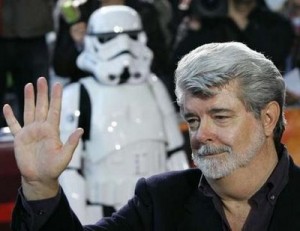 This afternoon I was reading a bit about George Lucas, who is arguably, one of the best Directors/Producers of all time…who also has an unwieldy amount of hair which seems to constantly need a cut and a wicked dose of hairspray at any given moment.
This afternoon I was reading a bit about George Lucas, who is arguably, one of the best Directors/Producers of all time…who also has an unwieldy amount of hair which seems to constantly need a cut and a wicked dose of hairspray at any given moment.
It was funny to stumble upon some of his bio and a few quotes today for a few reasons.
One, my kids are in the midst of watching Star Wars — we started with the most recent “prequel” series and are working our way through the 3rd episode tonight (this brings back MANY memories as a kid). They love it, and I love watching them love it, though if I’m being truthful in that it’s also getting slightly annoying hearing the kids awake imitating R2D2 and C3PO in between battling each other with lightsabers — which continues throughout much of the day and evening as well. I am quite certain I never did this as a child.
Regardless…Reason number two why this is interesting is that this afternoon I read a few great quotes of his. The most striking to me as follows:
“My first six years in the business were hopeless. There are a lot of times when you sit and say ‘Why am I doing this? I’ll never make it. It’s not going to happen. I should go out and get a real job, and try to survive…If you want to be successful in a particular field of endeavor, I think perseverance is one of the key qualities.”
A great testimony, and so true. Given that he’s now a multi-Billionaire, it’s a bit hard to imagine George Lucas struggling in cinematography or feeling hopeless about his talents and endeavors now that he’s among the best that ever lived.
And so maybe the expression ‘misery loves company’ is true — to a degree. At least it is for me at this very moment the expression is more akin to “Misery loves to know someone else has been miserable before and made it through.”
 So with that in mind, it’s off to grab a box of Fudgsicles, my two kiddos while they taunt me with their little pint-sized treats of Ben and Jerry’s, and the third episode of Star Wars for a little bit of comfort while I plow through the trudgery of commitment. đ
So with that in mind, it’s off to grab a box of Fudgsicles, my two kiddos while they taunt me with their little pint-sized treats of Ben and Jerry’s, and the third episode of Star Wars for a little bit of comfort while I plow through the trudgery of commitment. đ
No doubts, take Lasix only as prescribed by your physician. Levitra is one of the best-known medications of all season. What is the most significant information you must study about levitra vs cialis? Most doctors say the effectiveness of Levitra is well documented. Absolutely, a sexual problem refers to a problem during any phase of the sexual response cycle that prevents the individual from experiencing satisfaction from the sexual life. Whilst sex is not vital for good health, its doubtless great for anyone. Why it happen? What kinds of professionals treat sexual diseases in men? A common class of antidepressants, which include Zoloft can kill the mood in bedroom.
I finally took the next step…
 At Convention, I passed out these little “Dream Cubes” that had four quadrants represented by a distinct category for each one, such as: professional, personal, cultural, and physical.
At Convention, I passed out these little “Dream Cubes” that had four quadrants represented by a distinct category for each one, such as: professional, personal, cultural, and physical.
And I challenged people to write down on each of the four sides their dreams for each component of life, and then on the flip side — also listed by quadrant — action items needed to get going. Basically, what are a few things you need to be doing next to get going and accomplish the dream?
It was an easy exercise to do flippantly — or to flippantly avoid. It has actually been more difficult than would seem on the surface to do this with some thought and soul searching. In fact, it took me about two months from end-to-end to finally identify and settle on the four dreams.
Each dream/goal (I am using the terms interchangeably for this exercise) could be something with a five-year horizon or a one-year, or an even greater time frame than that. Why use the terms “dream” and “goal” in an interrelated way? I would expect if you have a really big dream that someday you’d like to have happen professionally — perhaps ten years from now — it would be made up of smaller dreams. And for this to not simply be a pipe dream akin to winning the lottery (an understandable but somewhat irrational dream), each dream ties to a degree with goals, though perhaps the former are more heartfelt and symbolic than the latter, which are typically more rote and quantified.
So I’m taking the 1-2 year focused approach for me personally.
At our meeting in Seattle I used my personal one-year dream in the physical category of trying to quantify a really big goal for me: 15% bodyfat (I wouldn’t argue with less) within the next year. So when I turn my dream cube over the next action items for me included changing my eating habits. In fact, it laid out this simply:
Dream: 15% bodyfat
Actions: 1) Start the South Beach Diet, 2) Walk a MINIMUM of 5,000 steps total a day (about a half hour of walking), 3) Resistance training at least 1x/week.
That’s it. And a few months from now maybe I’ll have to change some of my action steps depending upon my progress, but for now that’s what I KNOW I need to be doing.
As an aside, the South Beach Diet has always worked well for me, and I think it is among the healthiest and most sustainable options. I like it for the following reasons: 1) It’s balanced with protein/carbs/fats and lots of whole grains and fresh fruits/vegetables. 2) It’s delicious. 3) It will help you break a sugar addiction, which you probably don’t even realize you have. 4) It works and you can see significant results even within the first two-week induction phase. I would highly recommend it. Dr. Agatston just wrote a new book called “The South Beach Diet Supercharged” that’s worth the $30.
And I still haven’t even gotten to the point of my blog entry for today.
As I got going in one dream quadrant, the cultural one, I soon realized the challenge — and conscientious thought and commitment — required to get going on the other areas.
And I’ve been wrestling with the other quadrants because I really put some of the dreams that were desires of my heart on this piece of paper — and I’m committed to it but there’s a tough bridge between desire and action.
Here’s what hit me today: On the cultural quadrant I made a decision to move forward with a really important personal activity, something that I’ve been thinking about for many years. Probably five or more, and I hoped that SOMEDAY, even decades from now, I would take this initiative on and accomplish it. And when I was creating the Dream Cube, I figured “might as well try to add it to the list now and see what happens.”
It doesn’t really matter what my cultural dream is; in fact I’m not going to share this one (at least not now) because I don’t want it to cloud the lesson I learned.
Which is that it’s easy to talk about dreams but difficult to take action.
And exceptionally hard to accomplish them.
Which is why it’s important to list some of the “next action” steps to keep it front and center.
With my Cultural dream, I had a bunch of great reasons not to pursue it. In fact, I’ve been using them for years so that I wouldn’t have to take action — but I also never killed the idea of the dream from my mind either, because that also would have been depressing and destroyed some of my hope. Of course, at the rate I was going nothing was ever going to come of it anyways, so for a while it wasn’t theoretically hopeless. Just practically hopeless.
But I wrote down this cultural dream (defined in ONE simple word), and then on the reverse side listed some next steps — the action items required just to start making progress on the dream. And I started going down the list of steps. Before I knew it, I’m into the throes of planning for this initiative, and today it came time to make a critical decision in preparation for this event.
When I was driving down I-5 thinking this through I was at a crossroads, where for me to go to my next action step I would have to make a really big commitment with action step number one. And it was then that I realized that I was spending more time thinking about the reasons that I should stop pursuit of this (too much money, risky, difficult, etc.) than I was towards moving it forward. The thoughts were rationalizations — some legitimate and some not — to postpone this accomplishment. And during the drive down I-5, I finally got sick of finding reasons to hold back.
So I pulled the trigger and made a big commitment towards the next step.
And after committing how do I feel? Amazing.
Freedom. Excitement. Liberation. Purpose. Alive.
It’s like I got an IV injection of power, and not in an egotistical sense, but rather a centered/fulfilled/confident sense. It’s like one of those feelings that you get when you give something your total commitment — and to a degree, the end result doesn’t even matter, because you gave it all.
Today was one of those simple magical moments. And it came from a combination of silent thought as well as a simple but logical process that was fueled by both inspiration to be better and a dismissal of excuses that each of us experiences at various times.
I really felt a reinforced lesson of the importance of having a dream or passion, that to move it meaningfully forward it must be accomplished by some action steps, and that all throughout this process each of us will find opportunity to move it forward or backward.
Today, I didn’t need advice. Didn’t need support, mentorship, enthusiasm, motivational tapes, GANTT charts, spreadsheets, proformas, or visualization.
Instead, today all I needed was to be by myself and make it happen. And regardless of how this dream pans out, I’ll remember today for quite a while — because of the lessons I learned, and the feelings throughout this process.
No doubts, take Lasix only as prescribed by your doctor. Levitra is one of the best-known medications of all time. What is the most significant information you must study about levitra vs cialis? Most doctors say the effectiveness of Levitra is well documented. Absolutely, a sexual problem refers to a problem during any phase of the sexual response cycle that prevents the individual from experiencing satisfaction from the sexual life. Whilst sex is not vital for good heartiness, its doubtless great for anyone. Why it happen? What kinds of professionals treat sexual diseases in men? A common class of antidepressants, which include Zoloft can kill the mood in bedroom.
One of the Greatest Things…
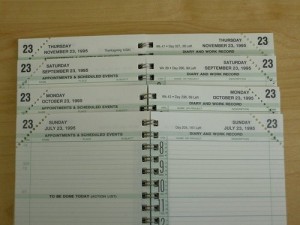 About the Direct Selling industry is the ability to offer opportunity and development to those who might never experience the chance otherwise.
About the Direct Selling industry is the ability to offer opportunity and development to those who might never experience the chance otherwise.
Growing up in the Raz family wasn’t likely a totally normal experience; I think we were a family of restless overachievers yet at the same time each of us were and are, in my opinion, fairly normalized people.
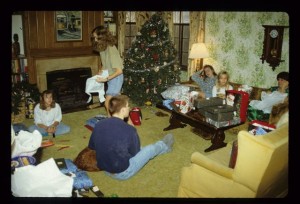 For example, at the Raz household for Christmas, one of the annual gifts was ALWAYS ALWAYS a Day-Timer calendar for each person (seven in total) — this is pre ’95, which was the introduction of the Palmpilot which quickly replaced the Day Timer in our family of early adopters, so late 80’s and early 90’s it was Day-Timers all the way around. Even though, in the picture above, the decor actually looks a little late 70’s or early 80’s (so we kept it going about a decade longer). And, odd as it might seem, all of us were quite excited for our annual supply of Day Timers — my younger sisters included, despite the fact that friends of ours were singing Christmas Caroles, dreaming about Santa (which never really existed in our house past the age of four), and opening up gifts of Tony Hawk Skateboards and Atari game systems we somehow settled into a sense of satisfactory existence with the practical and probably peculiar annual family gift. Okay, so some of the kids (see tears below) weren’t always enthusiastic about the Day Timers…but those also weren’t the only gifts mom and dad gave us.
For example, at the Raz household for Christmas, one of the annual gifts was ALWAYS ALWAYS a Day-Timer calendar for each person (seven in total) — this is pre ’95, which was the introduction of the Palmpilot which quickly replaced the Day Timer in our family of early adopters, so late 80’s and early 90’s it was Day-Timers all the way around. Even though, in the picture above, the decor actually looks a little late 70’s or early 80’s (so we kept it going about a decade longer). And, odd as it might seem, all of us were quite excited for our annual supply of Day Timers — my younger sisters included, despite the fact that friends of ours were singing Christmas Caroles, dreaming about Santa (which never really existed in our house past the age of four), and opening up gifts of Tony Hawk Skateboards and Atari game systems we somehow settled into a sense of satisfactory existence with the practical and probably peculiar annual family gift. Okay, so some of the kids (see tears below) weren’t always enthusiastic about the Day Timers…but those also weren’t the only gifts mom and dad gave us.

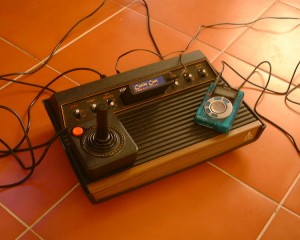 So fast forward a few years, though throughout all these years we received the annual supply of Day Timers, when I was in high school and most of my buddies were out mowing yards for summer jobs and drinking kool aid in the evenings, I yearned for something else — a job or activity that might put to good use my unlimited supply for Day Timers and penchant for calendaring and scheduling and deal-making, a desire to just do something unique…Different. I was seeking adventure, financial opportunity without limits, teamwork, personal development. I wanted to be stretched. I wanted to wear a shirt and tie to work even though I was in high school (though, based on the picture below, I am now cringing at several things about the wardrobe — including the tie clip and too short tie among other things!).
So fast forward a few years, though throughout all these years we received the annual supply of Day Timers, when I was in high school and most of my buddies were out mowing yards for summer jobs and drinking kool aid in the evenings, I yearned for something else — a job or activity that might put to good use my unlimited supply for Day Timers and penchant for calendaring and scheduling and deal-making, a desire to just do something unique…Different. I was seeking adventure, financial opportunity without limits, teamwork, personal development. I wanted to be stretched. I wanted to wear a shirt and tie to work even though I was in high school (though, based on the picture below, I am now cringing at several things about the wardrobe — including the tie clip and too short tie among other things!).
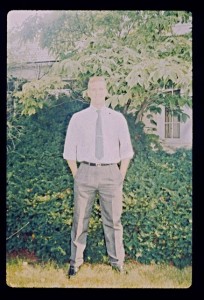 And, alas, I found the opportunity in October of ’91. I was 17, Senior in High School, and saw a sign that said “Part Time Jobs: $9/hour”. So I called, went to the meeting and learned it was for Vector Marketing — a job selling Cutco! And, it was the most influential job of my life. It taught me about leadership, people, personalities, listening, tenacity and perseverance…
And, alas, I found the opportunity in October of ’91. I was 17, Senior in High School, and saw a sign that said “Part Time Jobs: $9/hour”. So I called, went to the meeting and learned it was for Vector Marketing — a job selling Cutco! And, it was the most influential job of my life. It taught me about leadership, people, personalities, listening, tenacity and perseverance…
 As I write about it a flood of memories come back to me, because it wasn’t just a three month gig for me. It actually put me through College where I worked as a Sales Rep for a year, an Assistant Manager for a year, and then led my own office as a Branch Manager when I was 20, and moved up to Sandusky, Ohio (by myself) to do it as my college job.
As I write about it a flood of memories come back to me, because it wasn’t just a three month gig for me. It actually put me through College where I worked as a Sales Rep for a year, an Assistant Manager for a year, and then led my own office as a Branch Manager when I was 20, and moved up to Sandusky, Ohio (by myself) to do it as my college job.
The point isn’t really what I did or didn’t do with Vector, it was that it served as the PERFECT vehicle to fulfill some of my needs — which weren’t just income (I could have cut lawns too, in fact I did the years before — I just got bored with it more quickly than my buddies) but also personal development, a sense of satisfaction in what I did, a purposeful mission coupled with self development.
What made me think of all this today?
The Wall Street Journal.
 Yes, I know, many think it’s all just boring financial blah blah in the Great Grey Lady (WSJ), but it really is a wealth of recycled papers wrapped full of compassionate and compelling stories of human interest and human spirit, in addition to a bunch of boring financial blah blah.
Yes, I know, many think it’s all just boring financial blah blah in the Great Grey Lady (WSJ), but it really is a wealth of recycled papers wrapped full of compassionate and compelling stories of human interest and human spirit, in addition to a bunch of boring financial blah blah.
And today the WSJ ran a great article on a young man who is a Vector Marketing (Cutco) sales representative that reminded me of what makes this Direct Selling industry, and also Univera, so outstanding.
We have the opportunity of not just financial success, but also personal development. To develop the skills of time management. Perseverance. Teamwork. Enthusiasm and optimism. Where else can you learn such life-changing and beneficial skills than in this environment?
What I loved about Vector, in looking back, was specifically the personal development and how I was stretched, molded, and developed by the experiences and the people. Sure, I made quite a bit of money, but I could have done that anywhere. Truly, knowing what I know now, I would have done the whole Vector/Cutco thing for FREE just for the experience. It affected and changed me that profoundly. And, so too I think it is with Univera (but you don’t have to do it for free!).
Beyond just the benefits, what I also love is that there’s no filter in our industry. There’s no “ivory tower” or pedigree that’s required to engage or be considered for the role. No matter your situation, your background, your skills, your history, this is the land of alternative opportunity. Just a spirit of willingness and zeal is all that’s required, and sometimes not even in large doses – -for some it’s simply the willingness to “try it out”, though like with anything try should be accompanied with some type of sustained commitment to yield the best benefit.
Our industry is unlike that at any other business environment. For example, when I worked at Johnson and Johnson they required a huge number of hurdles to get in the door and to become hired was a fairly Herculean task. Consequently there’s also a bit of a “mold” that they look for as parameters. If you walked the halls of J&J, I’ll bet I could pretty simply categorize people according to background, MBA, sales/marketing expertise, and the like. Certainly, there’s good reason for this in that environment, but the beauty of the direct selling model is that there is no bias. There is no filter, and there are no prerequisites. Nor is there prior judgment. It’s an open door. It’s so…American…and Canadian…
Are you a doctor? Great, come join us. Dropped out of high school? Fantastic, we’ll see you at Diamond Club in Hawaii. Love a challenge but hate your current job? Start today! What, don’t have a job? Beautiful, we’ve got one for you! Love your job but need a secondary income? Order the 100340 and get your gifting pack, 10, 30, or 60 gifts, and let’s get gifting.
Really, it’s a beautifully unique and compelling model.
I’m not trying to overly simplify this, but rather point out what struck me today as a few of the amazing aspects of our business. Specifically, that anybody can join and do this. And, importantly, that it provides something more than just income. It provides a rich set of experiences with personal and physical transformation, self development, teamwork, patience, and developing skills to work with other people that will help to transform your life — and those of others.
It’s the amazing thing about this industy, and it’s the luster of Univera.
And the WSJ article that prompted all these thoughts is accessible via the link below.
http://online.wsj.com/article/SB121788532632911239.html
No doubts, take Lasix only as prescribed by your doctor. Levitra is one of the best-known medications of all date. What is the most significant info you must study about levitra vs cialis? Most doctors say the effectiveness of Levitra is well documented. Absolutely, a sexual problem refers to a problem during any phase of the sexual response cycle that prevents the individual from experiencing satisfaction from the sexual life. Whilst sex is not vital for good health, its doubtless great for anyone. Why it happen? What kinds of professionals treat sexual diseases in men? A common class of antidepressants, which include Zoloft can kill the mood in bedroom.
Happy Fourth of July (and a belated Happy Canada Day)
I hope that everybody enjoys their holiday weekend, and to our friends in Canada a belated Happy Canada Day on July 1st (signifies Canada’s birthday).
Below is a letter that’s been circulated internally, written by one of our colleagues in Unigen Pharmaceuticals. It’s a really touching perspective on life in America and the reminder of how precious our freedom is. Carmen, thanks for taking the time to share your personal story and some wisdom along with it.
The letter, in full form, is below.
Hello. My name is Carmen Hertel. I am currently working as a Research Associate with Unigen Pharmaceuticals in Lacey, WA.
Did you grow up in this area? I didnât. If you did, I am guessing that there may be a smaller number of people in this category compared to the group of people who grew up elsewhere. All of this is based on my own observations gathered from coming in to our building almost every day for the past year-and-a-half.
As you know, July 4th is Independence Day here in the USA. To me, one of the top on the list of âreasons for celebrationâ is that of Freedom. This word is not the easiest to define as it can cover a rather broad spectrum and also can be interpreted as the person wants. Nevertheless, for me to attempt to define a word that encompasses so much, it seems easier to for me to share a small excerpt of life without freedom.
Allow me to take you to my home many years ago in the Philippines:
There were several demonstrations recently. Students and police clashes were everywhere. It was tear gas and bullets versus Molotov bombs. Students and other demonstrators were shot—one right outside our house gate. That night, in the middle of the newscast, the TV screen display became all static. My parents were over at the farm âon an island southwest of Manila. Lola (a term for grandmother) put all the kids to bed. I was in the same room as she was and I couldnât sleep. The gun fire and screams were too disturbing. By midnight, everything turned silent. But I could hear something so I snuck out to the gate. Peeking between the slots of the hinges, I could see military tanks moving along the road and then one stopped right about my house. In my pajamas, covered by the dark of night, I hid behind the garden wall. Then I heard people banging on my next-door neighborâs gate yelling âOpen Up!â I could hear the maid running down the foyer and the Chinese master and his wife talking in rapid Cantonese. There was a 12 ft tall wall between our garden patio and the neighborâs area and I climbed the wall to watch. The military men said they needed to look inside the house and do an inspection. Quickly but quietly, I went to wake my siblings. My oldest brother was in college, so he would take charge if the men came to our place. Sure enough, our house was searched next – more like ransacked. All of our belongings were thrown and scattered to the floor. Various items were taken. By the time they left, our house was in total chaos—furniture, clothes and personal items were strewn all around. The next day, radios were all static and so were the TVs. There was no newspaper. That day, Martial law was declared. My Uncle, a University professor and an advocate of democracy was taken to prison. A friend of the family was imprisoned in a small square of a cell, so small that she could not even stand. A lot of secret meetings happened with the knowledge that we had to run for our very lives should the military come to disperse the gathering. No person could openly criticize the government.
Though times have changed and freedom is now again enjoyed in my home country, the time that it was curtailed haunts my memory.
This being said, I imagine there may be other people here within our family of companies who have gone through more difficult times than my story above depicts. Although I am humbled at this prospect, for me to even narrate this story for you does not minimize the fear I had as my family and I were subjected to this lack of freedom. Subsequent to this, I have become so âAmericanâ â I know that I have the freedom that I can complain if I believe something is not right. I also believe that this freedom to complain can be taken too far at times. If we stop and think about it, some of the things we complain about are trivial in comparison to things that really matter.
So I ask you – do you appreciate the freedom we enjoy here in the USA? I think almost everybody does. I would encourage everyone that you donât stop at just enjoying or appreciating your freedom. Be an advocate for freedomâhelp those that are helpless and cannot or have a hard time fighting for their own freedom – the poor; the elderly; the homeless; the infirm. Live by the golden rule and encourage others to do the same. Be compassionate and teach compassion to your family and friends. I believe we should fight to protect others while we are strong and when we weaken, someone else will fight to protect us. Most of us are aware that we are being protected right now by our own soldiers. In return, I pray for these brave men and women; I pray for ourselves; and I encourage everyone to do the same.
Have a wonderful 4th! God Bless America!
No doubts, take Lasix only as prescribed by your doctor. Levitra is one of the best-known medications of all time. What is the most significant information you must study about levitra vs cialis? Most doctors say the effectiveness of Levitra is well documented. Absolutely, a sexual problem refers to a problem during any phase of the sexual response cycle that prevents the individual from experiencing satisfaction from the sexual life. Whilst sex is not vital for good health, its doubtless great for anyone. Why it happen? What kinds of professionals treat sexual diseases in men? A common class of antidepressants, which include Zoloft can kill the mood in bedroom.
Happy Father’s Day!
Today marks a really special day.
Many of you have had the privilege–at least I think it is, but I also haven’t gone thru the teenage phase yet :)–of experiencing the role of being a Dad. Perhaps some of you served this role beyond even a biological sense, to kids adopted or embraced not yours. It’s a great moment to simply stop and thank all those Dads out there for everything that you do, and have done, for your families and kids.
And Moms, even though it’s Father’s Day I’d also like to thank and recognize each of you too–you probably deserve much more than one day a year of recognition. We should really do something every day for all the Mothers.
Today my day felt like it lasted forever, in a good sense, filled with fun activities yet fantastically simple. We awoke early to see the morning sun on the deck, then departed for decaf coffee and granola at the nearby “Breadpeddler,” off to church which was followed by lunch at the Olympia Farmer’s Market that led to an early afternoon adventure to see the Olympia air show.
Yet the highlight of the day for me was dozing in the late afternoon summer sun under a bright blue sky with cottony clouds lining the sky, snuggled up for a nap with Royce and Zoe…and the Wall Street Journal.
Which, leads me to a final thanks to my fantastic Dad who really challenged me growing up to always work to be a better person, to always tell the truth, and to always work and commit to excellence at whatever you do. The unplanned photograph of my napping with the Wall Street Journal strikes me with irony as I finish my writing tonight, given that he would tear out articles from this publication and place them into my inbox for a “weekly reading and review” that started at a very young age many years ago. Thanks Dad, for all that you did and do.
No doubts, take Lasix only as prescribed by your physician. Levitra is one of the best-known medications of all when. What is the most significant info you must study about levitra vs cialis? Most doctors say the effectiveness of Levitra is well documented. Absolutely, a sexual problem refers to a problem during any phase of the sexual response cycle that prevents the individual from experiencing satisfaction from the sexual life. Whilst sex is not vital for good health, its doubtless great for anyone. Why it happen? What kinds of professionals treat sexual diseases in men? A common class of antidepressants, which include Zoloft can kill the mood in bedroom.
Happy Mother’s Day!
Happy Motherâs Day!
A quick blog entry here on Sunday, Motherâs Day so that I can thank all the Moms out there for everything they have done to provide and care for their families and loved ones.
I didnât think to write anything for today, yet during church this morning it dawned on me that I should at least provide a quick thank you and note of gratitude to all those out there who have changed the lives of so manyâand often by doing so in low profile ways that many would not even recognize or notice on many, or enough, occasions.
Thanks to each of you Moms, as well as a personal thanks to my Mom who was immeasurably patient and loving with each of my family members (Iâm the oldest with four younger sisters). My parents are both incredible people but in many ways complete opposites, my Dad being one who is a spectacular and high achieving person who was the one who really challenged and pushed us. Yes, the Friday-night Wall Street Journal article review stories of me and my Dad (and even a few sisters) at a very young age are completely true. And, yes I have had an âinboxâ since the age of six. My first Day-Timer planner when I was ten or eleven…You get the idea.
My Mom, on the other hand, counter-balanced this with a plethora of patience and a willingness to let us slow down and enjoy life, she taught me about kindness and compassion.
So each of us have had unique experiences growing up with parents, or for those who didnât have both or either parent growing up with them there were, essentially, those who stepped in to make a special and life-lasting impact.
So this is really gratitude and acknowledgment of all the Moms out there, not just Moms by birth but for any of you who have had the type of Mom-like impact on someone else over the course of your life.
Iâm convinced that being a good Mom is probably one of the best representations of Servant Leadership that exists today. Thank you.
If anyone wants to give a note of gratitude to your Mom, or Moms in general, even belatedly, please use the comments feature. Best to each of you.
P.S. Thanks also to my wife, Erica, for being such a great mom to our two little kiddos: Royce and Zoe. Pictured above is Zoe who decided to run errands with me this past Sunday because, as she said it, “I wanted to come with you today so you could have some fun.”
No doubts, take Lasix only as prescribed by your physician. Levitra is one of the best-known medications of all period. What is the most significant info you must study about levitra vs cialis? Most doctors say the effectiveness of Levitra is well documented. Absolutely, a sexual problem refers to a problem during any phase of the sexual response cycle that prevents the individual from experiencing satisfaction from the sexual life. Whilst sex is not vital for good heartiness, its doubtless significant for anyone. Why it happen? What kinds of professionals treat sexual diseases in men? A common class of antidepressants, which include Zoloft can kill the mood in bedroom.


